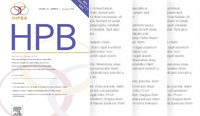International Hepato-Pancreato-Biliary Association
HPB Blog: May 2016

Setting Standards in HPB Surgery
From HPB fellowship training to the utilization of ALPPS, the current issue of HPB calls for and drives us towards the establishment of evidence-based standards for the safe delivery of HPB surgical care.
In a thoughtful leader authored by Robson and Parks , the current global state of HPB fellowship training is reviewed, identifying the significant good work that has been done around the world in the areas of training program accreditation and certification of HPB surgeons, but also highlighting the inconsistencies and heterogeneity in training paradigms. Also in the domain of training, Baker and colleagues highlight the competitive nature of HPB fellowships, with a 1:3 likelihood of being admitted to an HPB surgical fellowship in North America.
Two provocative studies explore the impact of the dissemination of Associating Liver Partition and Portal Vein Ligation for Staged Hepatectomy (ALPPS) on alteration of the classically described technique and the creep of surgical indications beyond metastatic colorectal metastases. A population based analysis of outcomes from a multicenter Italian audit identifies risks factors which portend a 90 mortality as high as 30% in select patient populations. Both studies call for cautious implementation of this surgical approach in select patients with adherence to the classically described surgical technique.
Two additional studies relating to liver cancer, primary and metastatic, explored the utilization of locoregional therapies in addition to sorafenib for locally advanced hepatocellular carcinoma. Sarpel and colleagues performed an intention to treat analysis using a propensity weighted proportional hazards model and identified a significant increase in survival with the addition of local regional therapies beyond sorafenib for these patients. Lemke and colleagues from the University of Toronto developed a decision model exploring the cost-effectiveness of utilizing intra-operative cell salvage during hepatic resection. They challenge the dogma of not using cell salvage techniques in the setting of malignancy, and demonstrate when this approach is also cost-effective.
In the realm of pancreatic surgery, an additional study from our Italian colleagues demonstrates in a population based analysis the critical importance of regionalization of care for pancreatic cancer. Not only were outcomes significantly improved, but the use of palliative/exploratory surgery was significantly reduced in high volume centers. In a complementary analysis by our North American colleagues, a report by the Central Pancreas Consortium in the United States affirms the importance of monitoring quality metrics to ensure optimal outcomes for patients being treated with pancreatic cancer.
Read all of these articles and more in the May Issue of HPB !
Rebecca Minter, MD.
Corporate Partners
If you are interested in becoming a Corporate Partner of the IHBPA please contact industry@ihpba.org
Find out more


